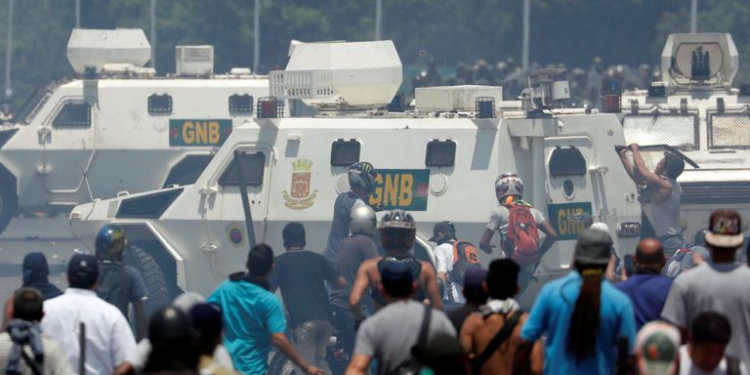Venezuela is embroiled in a deep political and humanitarian crisis. The South American country is in the middle of a total breakdown in political stability even as opposition leader Juan Gauido declared himself interim President in the month of January and was backed by the US and a dozen other countries. He called on Venezuelans to take to the streets in a bold attempt to seize power from President Nicolás Maduro. This has resulted in confrontations between Guaido’s military supporters and the faction supporting Maduro. While Guaido claims that the military-which is said to hold the key to power in Venezuela-is deserting the President. The government, on the other hand, claimed that the situation was under control and that the military is behind Maduro.
Things have taken an ugly turn even as a video surfaced in which armoured National Guard vehicles can be seen running over protesters in the streets of Caracas-the capital city of Venezuela. This has been dubbed as Venezuela’s “Tiananmen Square” moment. Maduro has alleged that the protests are a “coup” planned by the US. The protests are likely to intensify even as Carlos Vecchio, Gauido’s representative in Washington said that the operations in Venezuela were only a beginning and that this “is an operation that is developing right now, you will see more events in the hours and days to come.”
However, it is important to understand that the roots of the unrest that has broken out in the South American country. Venezuela, which was at one time Latin America’s richest country, with the world’s largest proven oil reserves suddenly finds itself in the middle of an ugly political crisis. It is not just a power struggle. Venezuela is the perfect example of the consequences of the State policy going overboard in a bid to implement socialism. There was a time when the admirers of the Venezuelan policies used to admire “21st century socialism” as it was dubbed by Hugo Chávez. According to Britain’s Jeremy Corbyn, the late Venezuelan president “showed us there is a different and a better way of doing things. It’s called socialism, it’s called social justice, and it’s something that Venezuela has made a big step toward.”
Venezuela followed the conventional socialist script. Government spending went up by 40 per cent of the GDP from 2000 to 2013. There was an exponential rise in minimum wages. President Maduro raised it six times last year. Venezuela also went on to shift the economic set up from corporates to co-operations. As of 2006, there were 1,00,000 co-operations employing more than 7,00,000 workers in the country.
All this was done by the Chavez regime in the middle of an oil-boom which clearly sustained Venezuela’s over pending and impractical socialist policies. However, once the oil boom ended, the Venezuelan economy went into a catastrophe. The government encountered budgetary problems and reacted by printing more currency, which led to a spike in inflation. Like any socialist country, price controls had to be imposed leading to more economic distortions followed by shortages. This economic turmoil fuelled a massive protest which was followed by repression as clear from the video of an armoured vehicle running over protesters. Therefore, going overboard with socialism and impractical lofty ideas has proved to be the undoing of Venezuela, once the richest country in South America. Venezuela serves as an important example for the rest of the world, especially for those countries which have populist political elements trying to cash in on socialism.

























